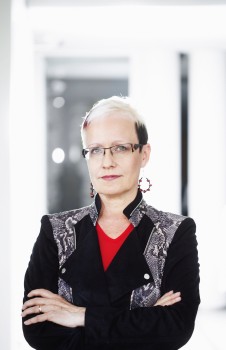Not so weird?
12 December 2013 | Non-fiction, Reviews

Johanna Sinisalo. Photo: Katja Lösönen
Johanna Sinisalo’s new novel Auringon ydin (‘The core of the sun‘, Teos, 2013), invites readers to take part in a thought experiment: What if a few minor details in the course of history had set things on a different track?
If Finnish society were built on the same principle of sisu, or inner grit, as it is now but with an emphasis on slightly different aspects, Finland in 2017 might be a ‘eusistocracy’. This term comes from the ancient Greek and Latin roots eu (meaning ‘good’) and sistere (‘stop, stand’), and it means an extreme welfare state.
In the alternative Finland portrayed in Auringon ydin, individual freedoms have been drastically restricted in the name of the public good. Restrictions have been placed on dangerous foreign influences: no internet, no mobile phones. All mood-enhancing substances such as alcohol and nicotine have been eradicated. Only one such substance remains in the authorities’ sights: chilli, which continues to make it over the border on occasion.
Vanna, the book’s protagonist, is hooked on chilli – or more precisely, the capsaicin contained within chillies. She needs ever-larger doses to feel a proper ‘hit’. In order to ensure a regular supply of chilli fixes, Vanna becomes a dealer. No one would suspect her of committing a crime, because she is an Eloi, a woman ‘who is active in the mating market and for whom the promotion of all aspects of male well-being is key’.
In this eusistocratic society, women have been divided into two groups on the basis of their utility. The feminine Eloi focus on pleasing men, looking after the home and giving birth to children. Morlocks, on the other hand, are sterilised so that they do not carry on their line of ‘defective’ women, and instead focus on performing work. Sinisalo has borrowed these designations from H.G. Wells’ classic 1895 science fiction novella The Time Machine.
In Auringon ydin there are two types of men as well: the super-manly Mascus (from the word masculine) and the wimpy Minusmen. Jare, another chilli addict and a Mascu, falls in love with Vanna, and their relationship leads them into life-threatening situations.
Johanna Sinisalo’s satire is bitingly on-target in the scenes where the Eloi’s education is reminiscent of dog obedience classes. The image of a country where the Health Authority decides what people require is pure black humour – it would be hilarious if it weren’t so frightening.
Sinisalo is a social critic, but her writing is very tangible, appealing to the senses. It makes for a unique reading experience: highly immersive, almost breath-taking. Vanna has the condition known as synaesthesia. She can smell other people’s emotions – delight smells like freshly mown grass, while love smells of rosemary – and she experiences the fire of capsaicin as colours and sounds. Sinisalo’s highly sensory prose achieves brilliance when one day Vanna gets hold of a fresh chilli – something she has never even seen before.
Tracking down the source of the chilli, Vanna discovers a mystical cult known as Gaianism. She witnesses the Gaianists developing the world’s hottest chilli variety, called the Core of the Sun. When she samples the new variety, Vanna finally comes to realise why chillies have been banned in the Eusistocratic Republic of Finland.
Johanna Sinisalo’s debut work, Not Before Sundown (original Finnish title: Ennen päivänlaskua ei voi, Tammi, 2000), is about a man who brings a troll home and falls under its woodland spell. That novel also features themes central to all of Sinisalo’s writing: fantasy, folklore and the mysticism of nature, as well as equality and the means of exercising power. Sinisalo was awarded the Finlandia Prize for Fiction for Not Before Sundown (now translated into 13 languages). Auringon ydin is her seventh novel.
Sinisalo is responsible for introducing a new boundary-breaking subgenre known as Finnish weird to literature in Finland. In her novels, fantasy serves as the catalyst for laying bare the dark sides of human nature and power structures. Then again, truth can sometimes be stranger than fiction: Auringon ydin contains an article on eugenics which was published in a Finnish magazine in 1935. Sinisalo demonstrates that ‘weird’ is never very far from everyday reality.
Translated by Ruth Urbom
Tags: fantasy, Finnish Weird, novel, science fiction
No comments for this entry yet
